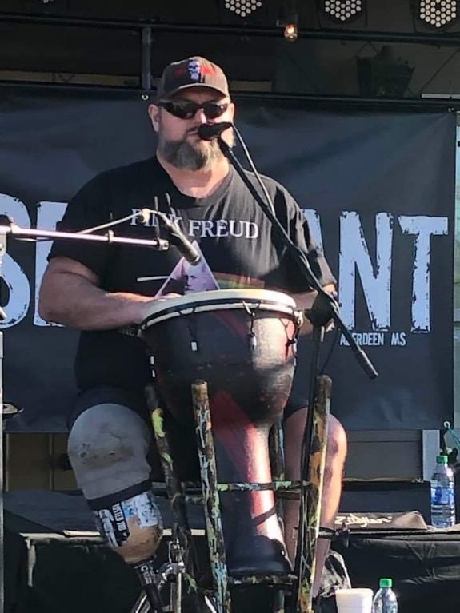Mississippi Today
How Medicaid expansion could have saved Tim’s leg — and changed his life
How Medicaid expansion could have saved Tim’s leg — and changed his life
Note: This article is part of Mississippi Today’s ongoing Mississippi Health Care Crisis project. Read more about the project by clicking here.
Tim Floyd has never been one to sit still.
After being forced to leave community college to move home to Guntown to help his mom pay the bills, he landed a job driving a truck in his early 20s. But three or four years later, he was diagnosed with sleep apnea, a dangerous condition for professional drivers because it can lead to fatigue and slow reactions when driving. Just like that, his truck driving career was over.
The health insurance that job had provided him abruptly disappeared — and his life has never been the same since.
“It made me no longer insurable to drive the truck, and that’s what led me down the path of not being able to find a job with health insurance and not being able to afford (private) insurance with the jobs I had,” said Floyd, now 46 years old.
Since then, Floyd has been trapped in what is called the "health insurance gap": he doesn't qualify for Mississippi's strict and limited Medicaid program, and he doesn't have private health insurance from an employer. He can't afford a private plan himself.
Meanwhile, over the past five years, Floyd's serious health problems have mounted. He’s been diagnosed with diabetes. He's lost part of his leg. He's battled cancer. He told Mississippi Today he’s sure he has medical debt, but he tries not to think about it: the past few years have just been about surviving each day.
Floyd’s conundrum is not unique in Mississippi. The state leads the nation in both rates of poverty and of uninsured people. Mississippi remains one of 12 states – and will likely soon be one of only 10 – not to accept federal dollars and provide health insurance to hundreds of thousands of Mississippians, many of them working poor.
Studies, including one from the state economist, have shown expanding Medicaid would cover up to about 230,000 Mississippians making up to 138% of the federal poverty level, or about $30,000 in annual income for a family of three. Floyd would have been covered under expanded Medicaid during the years he worked as a cashier and other low wage jobs, but because Mississippi never expanded, he wasn't.
The study also showed the state would save anywhere from $186 million to $207 million from 2022 through 2027 and create thousands of jobs.
Medicaid expansion has also been associated with reductions in mortality in addition to declines in medical debt, which is highest in the South and in lower-income communities.
But both Speaker of the House Philip Gunn and Gov. Tate Reeves remain unwaveringly opposed to expansion.
“Extending Medicaid to people who can’t afford health insurance would offer them and their families basic financial security to live a healthy life, that includes preventative care. Mississippians shouldn’t face financial ruin if they need health care or worry that a lack of preventative health care could cost them their lives,” said Roy Mitchell, executive director of the Mississippi Health Advocacy Program.
After he lost the trucking job, Floyd then worked many other jobs – including multiple at one time – but never landed another that offered health insurance.
The combination of jobs wasn’t enough to afford private insurance or pay out-of-pocket medical costs. So he remained uninsured and stopped going to the doctor.
Six in 10 uninsured adults say they have postponed getting health care they needed due to cost, according to KFF. Uninsured adults are also more likely to report skipping recommended tests or treatment due to cost than adults with insurance.
In 2012, that practice caught up to Floyd. He was working a construction job when a rock got stuck under his foot inside his boot and created a sore. He put some antibiotic ointment and a Bandaid on it and continued working. But six months later, the sore became infected and his foot swelled up. He used savings to go see a doctor, who referred him to a wound specialist.
For the next five years, he battled that sore: he would treat it and stay off his feet for a month (which would sometimes cause him to lose whatever job he had at the time), the sore would heal, and he would go back to work. Then the whole cycle repeated again.
In 2017, a doctor suggested he have his blood sugar tested. So Floyd, again, dipped into his savings for a basic appointment and test. The results showed he was diabetic, and the sores were diabetic foot ulcers. The infection was now in his bones.
There was only one option at that point: amputate his leg from the knee down. So again, just like that, his life changed. The charity program at North Mississippi Medical Center where he received his care covered the costs of the surgery, he said. Six months later, he was fitted for a prosthetic and began the process of rebuilding his strength and relearning how to do the things dear to him: basic things like walk, take care of the family’s dog, play the drums.
“It was hard. It was hard not only on me but on the people that cared about me,” he said. “Also, my emotional health wasn’t all that great … It took me about another year (after getting the prosthetic) to be able to walk unassisted – no cane or walker or nothing. Then, just building – going from being pretty active to being very sedentary to trying to get active again took me another year from that before I got my stamina back up to where I could work.”
Tim Floyd, left, listens as his father, Macky Floyd, plays the guitar at their home in Guntown, Miss., Friday, Nov. 4, 2022.
The Tupelo hospital – a hub for health care and employment in north Mississippi – offers a financial assistance program for uninsured and underinsured patients like Floyd who need emergency or medically necessary care. The hospital and its subsidiaries spent over $190 million in fiscal year 2021 in charity care and uninsured discounts.
The hospital is situated in the district of Sen. Chad McMahan, a Republican who also lives in Floyd’s same small hometown of Guntown. McMahan drew criticism from Republican counterparts in 2021 when he indicated he was willing to discuss Medicaid expansion “and look at what (it) might look like.”
Today, he still maintains he sympathizes with people who work but are uninsured. He says he’s not for Medicaid expansion, per se, but does believe it should be discussed and that the health care system in Mississippi needs to be reformed.
“I think everything has to be on the table – whether or not we’re going to have Medicaid enhancements or Medicaid expansion or if we’re going to have a modernization of the way prices, menu prices, are put out from hospitals,” or how insurance companies operate, he said.
McMahan said he regularly speaks with administrators at the hospital that employs nearly 9,000 people.
“For the hospital system I represent, they have annual salaries of half a billion a year and then an annual income revenue stream of 1 billion-plus. Last year, they gave away 19% in charity,” he said. “… It’s unsustainable. In what other business can you give away 19% (and survive)?”
Beyond the economics of Medicaid expansion and health care reform, McMahan, who grew up without health insurance as the son of a carpenter and a clerk, says he feels for Floyd and identifies with him.
“In the 9th grade I got hurt, and my parents didn’t have insurance … I remember seeing the fear in my family’s eyes and hearing discussions at the dinner table when my parents would be discussing what we were going to eliminate from the family budget that month to pay for the $20,000 hospital bill I had,” he said.
“I’m sympathetic to him (Floyd) because I was like that myself … If we’re going to do any type of Medicaid overhaul, there has to be a work requirement. I’m not for anyone getting a public service unless they’re in a position to contribute.”

Finally recovered from losing his leg, Floyd started submitting job applications again in 2020 – right as the U.S. began reporting its first COVID-19 cases and the country subsequently shut down.
Floyd, still uninsured and ineligible for disability, discovered a knot on his neck. He went to the doctor and was diagnosed with an ear infection and prescribed antibiotics. Floyd said the doctor didn’t mention any further testing.
“You know, actually, most doctors that I’ve dealt with understand my situation. Because I am uninsured, they don’t even bring that stuff (additional testing) up,” he said about.
Over the next year, the lump got bigger. He returned to the same doctor, who at that time recommended a biopsy. The biopsy, which the hospital’s charity care program again covered, revealed he had stage II Hodgkin’s lymphoma.
The oncologist told him if it had been diagnosed earlier, it would’ve been caught at stage I and required less rigorous treatment, he said.
He went through six weeks each of chemotherapy and radiation, which burned his vocal chords. Until now, his health conditions hadn’t kept him from his musical talents: singing and playing the drums in a band called Proximity Rule. But for a while, he couldn’t sing, and it was difficult to even speak.
Floyd, who has been in remission since May of 2021, is now on disability, which pays him about $800 a month. The cancer and amputated leg didn’t qualify him for the government assistance – but the later addition of a severe carpal tunnel diagnosis did.
Looking back, he says, the logic of state leaders who have refused to expand Medicaid is baffling.
“It would make a lot more sense to find people like me … and (give) them Medicaid for a short period of time to get back healthy so they can continue working and continue providing for their family ….,” he said. “Because if they don’t have health insurance, they don’t go to the doctor and get seen, eventually they’re gonna be just like me, and we’re on the hook for them for the rest of their life.”
This article first appeared on Mississippi Today and is republished here under a Creative Commons license.
Mississippi Today
Hospitals see danger in Medicaid spending cuts
Mississippi hospitals could lose up to $1 billion over the next decade under the sweeping, multitrillion-dollar tax and policy bill President Donald Trump signed into law last week, according to leaders at the Mississippi Hospital Association.
The leaders say the cuts could force some already-struggling rural hospitals to reduce services or close their doors.
The law includes the largest reduction in federal health and social safety net programs in history. It passed 218-214, with all Democrats voting against the measure and all but five Republicans voting for it.
In the short term, these cuts will make health care less accessible to poor Mississippians by making the eligibility requirements for Medicaid insurance stiffer, likely increasing people’s medical debt.
In the long run, the cuts could lead to worsening chronic health conditions such as diabetes and obesity for which Mississippi already leads the nation, and making private insurance more expensive for many people, experts say.
“We’ve got about a billion dollars that are potentially hanging in the balance over the next 10 years,” Mississippi Hospital Association President Richard Roberson said Wednesday during a panel discussion at his organization’s headquarters.
“If folks were being honest, the entire system depends on those rural hospitals,” he said.
Mississippi’s uninsured population could increase by 160,000 people as a combined result of the new law and the expiration of Biden-era enhanced subsidies that made marketplace insurance affordable – and which Trump is not expected to renew – according to KFF, a health policy research group.
That could make things even worse for those who are left on the marketplace plans.
“Younger, healthier people are going to leave the risk pool, and that’s going to mean it’s more expensive to insure the patients that remain,” said Lucy Dagneau, senior director of state and local campaigns at the American Cancer Society.
Among the biggest changes facing Medicaid-eligible patients are stiffer eligibility requirements, including proof of work. The new law requires able-bodied adults ages 19 to 64 to work, do community service or attend an educational program at least 80 hours a month to qualify for, or keep, Medicaid coverage and federal food aid.
Opponents say qualified recipients could be stripped of benefits if they lose a job or fail to complete paperwork attesting to their time commitment.
Georgia became the case study for work requirements with a program called Pathways to Coverage, which was touted as a conservative alternative to Medicaid expansion.
Ironically, the 54-year-old mechanic chosen by Georgia Gov. Brian Kemp to be the face of the program got so fed up with the work requirements he went from praising the program on television to saying “I’m done with it” after his benefits were allegedly cancelled twice due to red tape.
Roberson sent several letters to Mississippi’s congressional members in weeks leading up to the final vote on the sweeping federal legislation, sounding the alarm on what it would mean for hospitals and patients.
Among Roberson’s chief concerns is a change in the mechanism called state directed payments, which allows states to beef up Medicaid reimbursement rates – typically the lowest among insurance payors. The new law will reduce those enhanced rates to nearly as low as the Medicare rate, costing the state at least $500 million and putting rural hospitals in a bind, Roberson told Mississippi Today.
That change will happen over 10 years starting in 2028. That, in conjunction with the new law’s one-time payment program called the Rural Health Care Fund, means if the next few years look normal, it doesn’t mean Mississippi is safe, stakeholders warn.
“We’re going to have a sort of deceiving situation in Mississippi where we look a little flush with cash with the rural fund and the state directed payments in 2027 and 2028, and then all of a sudden our state directed payments start going down and that fund ends and then we’re going to start dipping,” said Leah Rupp Smith, vice president for policy and advocacy at the Mississippi Hospital Association.

Even with that buffer time, immediate changes are on the horizon for health care in Mississippi because of fear and uncertainty around ever-changing rules.
“Hospitals can’t budget when we have these one-off programs that start and stop and the rules change – and there’s a cost to administering a program like this,” Smith said.
Since hospitals are major employers – and they also provide a sense of safety for incoming businesses – their closure, especially in rural areas, affects not just patients but local economies and communities.
U.S. Rep. Bennie Thompson is the only Democrat in Mississippi’s congressional delegation. He voted against the bill, while the state’s two Republican senators and three Republican House members voted for it. Thompson said in a statement that the new law does not bode well for the Delta, one of the poorest regions in the U.S.
“For my district, this means closed hospitals, nursing homes, families struggling to afford groceries, and educational opportunities deferred,” Thompson said. “Republicans’ priorities are very simple: tax cuts for (the) wealthy and nothing for the people who make this country work.”
While still colloquially referred to as the One Big Beautiful Bill Act, the name was changed by Democrats invoking a maneuver that has been used by lawmakers in both chambers to oppose a bill on principle.
“Democrats are forcing Republicans to delete their farcical bill name,” Senate Democratic Leader Charles Schumer of New York said in a statement. “Nothing about this bill is beautiful — it’s a betrayal to American families and it’s undeserving of such a stupid name.”
The law is expected to add at least $3.3 trillion to the nation’s debt over the next 10 years, according to the most recent estimate from the Congressional Budget Office.
This article first appeared on Mississippi Today and is republished here under a Creative Commons Attribution-NoDerivatives 4.0 International License.
The post Hospitals see danger in Medicaid spending cuts appeared first on mississippitoday.org
Note: The following A.I. based commentary is not part of the original article, reproduced above, but is offered in the hopes that it will promote greater media literacy and critical thinking, by making any potential bias more visible to the reader –Staff Editor.
Political Bias Rating: Center-Left
This article reports on the negative impacts of a major federal tax and policy bill on Medicaid funding and rural hospitals in Mississippi. While it presents factual details and statements from stakeholders, the tone and framing emphasize the harmful consequences for vulnerable populations and health care access, aligning with concerns typically raised by center-left perspectives. The article highlights opposition by Democrats and critiques the bill’s priorities, particularly its effect on poor and rural communities, suggesting sympathy toward social safety net preservation. However, it maintains mostly factual reporting without overt partisan language, resulting in a moderate center-left bias.
Crooked Letter Sports Podcast
Podcast: The Mississippi Sports Hall of Fame Class of ’25
The MSHOF will induct eight new members on Aug 2. Rick Cleveland has covered them all and he and son Tyler talk about what makes them all special.
Stream all episodes here.
This article first appeared on Mississippi Today and is republished here under a Creative Commons Attribution-NoDerivatives 4.0 International License.
The post Podcast: The Mississippi Sports Hall of Fame Class of '25 appeared first on mississippitoday.org
Mississippi Today
‘You’re not going to be able to do that anymore’: Jackson police chief visits food kitchen to discuss new public sleeping, panhandling laws
Diners turned watchful eyes to the stage as Jackson Police Chief Joseph Wade took to the podium. He visited Stewpot Community Services during its daily free lunch hour Thursday to discuss new state laws, which took effect two days earlier, targeting Mississippians experiencing homelessness.
“I understand that you are going through some hard times right now. That’s why I’m here,” Wade said to the crowd. “I felt it was important to come out here and speak with you directly.”
Wade laid out the three bills that passed earlier this year: House Bill 1197, the “Safe Solicitation Act,” HB 1200, the “Real Property Owners Protection Act” and HB 1203, a bill that prohibits camping on public property.
“Sleeping and laying in public places, you’re not going to be able to do that anymore,” he said. “There’s a law that has been passed that you can’t just set up encampments on public or private properties where it’s a public nuisance, it’s a problem.”
The “Real Property Owners Protection Act,” authored by Rep. Brent Powell, R-Brandon, is a bill that expedites the process of removing squatters. The “Safe Solicitation Act,” authored by Rep. Shanda Yates, I-Jackson, requires a permit for panhandling and allows people to be charged with a misdemeanor if they violate this law. The offense is punishable by a fine not to exceed $300 and an offender could face up to six months in jail. Wade said he’s currently working with his legal department to determine the best strategy for creating and issuing permits.
“We’re going to navigate these legal challenges, get some interpretations, not only from our legal department, but the Attorney General’s office to ensure that we are doing it legally and lawfully, because I understand that these are citizens,” he said. “I understand that they deserve to be treated with respect, and I understand that we are going to do this without violating their constitutional rights.”
Wade said the Jackson Police Department is steadily fielding reports of squatters in abandoned properties and the law change gives officers new power to remove them more quickly. The added challenge? Figuring out what to do with a person’s belongings.
“These people are carrying around what they own, but we are not a repository for all of their stuff,” he said. “So, when we make that arrest, we’ve got to have a strategic plan as to what we do with their stuff.”
Wade said there needs to be a deeper conversation around the issues that lead someone to becoming homeless.
“A lot of people that we’re running across that are homeless are also suffering from medical conditions, mental health issues, and they’re also suffering from drug addiction and substance abuse. We’ve got to have a strategic approach, but we also can’t log jam our jail down in Raymond,” Wade said.
He estimates that more than 800 people are currently incarcerated at the Raymond Detention Center, and any increase could strain the system as the laws continue to be enforced.
“I think there’s layers that we have to work through, there’s hurdles that we are going to overcome, but we’ve got to make sure that we do it and make sure that my team and JPD is consistent in how we enforce these laws,” Wade said.
Diners applauded Wade after he spoke, in between bites of fried chicken, salad, corn and 4th of July-themed packaged cakes. Wade offered to answer questions, but no one asked any.
Rev. Jill Buckley, executive director of Stewpot, said that the legislation is a good tool to address issues around homelessness and community needs. She doesn’t want to see people who are homeless be criminalized, but she also wants communities to be safe.
“I support people’s right to self determine, and we can’t impose our choices on other people, but there are some cases in which that impinges on community safety, and so to the extent that anyone who is camping or panhandling or squatting and is a danger to themselves and others, of course, I fully support that kind of law. I don’t support homelessness being criminalized as such,” Buckley said.

Many of the people Wade addressed while they ate Thursday said they have housing, don’t panhandle, and shouldn’t be directly impacted by the legislation. But Marcus Willis, 42, said it would make more sense if elected officials wanted to combat the negative impacts of homelessness that they help more people secure employment.
“There ain’t enough jobs,” said Willis, who was having lunch with his girlfriend Amber Ivy.
The two live in an apartment together nearby on Capitol Street, where Ivy landed after her mother, whom Ivy had been living with, suffered a stroke and lost the property. Similarly, Willis started coming to eat at Stewpot after his grandmother, whose house he used to visit for lunch, passed away.
Willis holds odd jobs – cutting grass, home and auto repair – so the income is inconsistent, and every opportunity for stable employment he said he’s found is outside of Jackson in the suburbs. The couple doesn’t have a car.
Making rent every month usually depends on their ability to find someone to help chip in, said Ivy, who is in recovery from substance abuse. She said she’s watched problems surrounding homelessness grow over the years in Jackson. Ivy grew up near Stewpot and has lived in various neighborhoods across the city – except for the times she moved out of state when things got too rough.
“There was just moments where I just had to leave,” Ivy said. “Sometimes if you hit a slump here, there’s almost no way for you to get out of it.”
This article first appeared on Mississippi Today and is republished here under a Creative Commons Attribution-NoDerivatives 4.0 International License.
The post 'You're not going to be able to do that anymore': Jackson police chief visits food kitchen to discuss new public sleeping, panhandling laws appeared first on mississippitoday.org
Note: The following A.I. based commentary is not part of the original article, reproduced above, but is offered in the hopes that it will promote greater media literacy and critical thinking, by making any potential bias more visible to the reader –Staff Editor.
Political Bias Rating: Center-Right
This article primarily reports on new laws in Jackson, Mississippi, targeting public sleeping, panhandling, and squatting, focusing on statements by Police Chief Joseph Wade and community perspectives. The coverage presents the legislative measures—authored by Republican and independent lawmakers—with a tone that emphasizes law enforcement challenges and community safety, reflecting a conservative approach to homelessness as a public order issue. While it includes voices concerned about criminalization and the need for social support, the overall framing centers on law enforcement and property protection. The article maintains factual reporting without overt editorializing but leans slightly toward a center-right perspective by highlighting legal enforcement as a solution.
-
News from the South - Arkansas News Feed7 days ago
Real-life Uncle Sam's descendants live in Arkansas
-
News from the South - Georgia News Feed6 days ago
'Big Beautiful Bill' already felt at Georgia state parks | FOX 5 News
-
News from the South - Oklahoma News Feed6 days ago
LOFT report uncovers what led to multi-million dollar budget shortfall
-
The Center Square4 days ago
Here are the violent criminals Judge Murphy tried to block from deportation | Massachusetts
-
Local News6 days ago
Maroon Tide football duo commits to two different SEC Teams!
-
Mississippi News Video7 days ago
Today’s First Alert Weather Kid is Ashlyn (7/4)
-
News from the South - South Carolina News Feed7 days ago
South Carolina lawmakers react as House approves Trump’s sweeping economic package
-
News from the South - Texas News Feed6 days ago
Hill Country flooding: Here’s how to give and receive help

















































